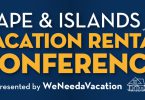 Vacation rental owners on the Cape and Islands may soon be faced with charging their guests a nearly 12% lodging tax if the MA legislature approves the bill before the end of the current legislative session on July 31.
Vacation rental owners on the Cape and Islands may soon be faced with charging their guests a nearly 12% lodging tax if the MA legislature approves the bill before the end of the current legislative session on July 31.
Why the renewed interest now?
Some state legislators and town boards have tried to have a lodging tax imposed on private home rentals for years, but, until recently, there’s been little political will on Beacon Hill. Due in part to the booming number of AirBnB units in cities throughout the country, including Boston, however, some lawmakers are concerned that big investors are buying up buildings and renting them out as short-term rental units, thus removing them from the potential inventory of affordable housing.
Who is backing the bill?
The hotel industry, primarily, is strongly lobbying to have all short-term rentals subject to the same rules as other lodging businesses. This is particularly aimed at rooms and apartments in Boston rented out via AirBnB and thus in competition with hotels, which are required to charge a lodging or room tax. But the tax would be levied against all vacation rental homes throughout the state.
In some cities, it is illegal to rent out a room or home for less than 30 days. In an effort to work towards complete legalization in Los Angeles, for example, AirBnB has agreed to charge hosts (homeowners) a 14% tax, which they will collect from hosts and pay a lump sum to the city.
One of our Wellfleet homeowners told his state rep. that:
“The ‘Airbnb Law’ (as it is known in San Francisco) has fully eliminated the concept of a vacation home. You cannot own a home that you use 25% of the time and rent out 75% of the time in that city. Airbnb advocates for the ‘hosting’ model, where owners live on site or live at the premises at least 270 days of the year, which is not at all like our vacation home model in Massachusetts. PLEASE consider the problem and solution as having two parallel constituents. There are the needs of Boston (and other cities) to prevent illegal housing and ensure safety standards as well as the needs of hotels who lobby for them. Then there are the needs of rural areas that fully depend on the tourism community. “
Why does WeNeedaVacation.com oppose the lodging tax for private rental homes?
- The average annual rent increase for Cape and Islands vacation homes is 2%. A nearly 12% increase in rent is unrealistic and would force homeowners to absorb the tax. Many vacationing families return to the same rental home every summer. This rental increase can be extremely disruptive to the repeat business that many homeowners rely on.
- Many Cape and Islands homeowners struggle economically due to the very seasonal nature of business here. Most are renting their homes, not out of a desire to enter the hospitality business or make a killing, but out of a clear need to pay their bills and keep their homes even through the long winter months when there is no income but continuing huge expenses.
- Proponents of the tax believe that vacationers should pay to use town services. But property owners already pay real estate taxes, and visitors often pay the towns for such amenities as beach stickers and permits.
- Rental homeowners already pay a lot more in tax per bedroom to the town than a hotel/motel. Homeowners pay based on property values, while hotel/motels pay based on net income, which is much lower.
- This tax could ultimately harm the tourism market, which in turn could bring down overall real estate values.
- A lodging tax on top of vacationers’ rental payment could easily lead some to go elsewhere for their vacation. This would send exactly the wrong message to visitors at the same time that the Chamber of Commerce is trying to attract new visitors to the Cape and Islands.
- Naturally, if the tax influences vacationers to go elsewhere and prevents homeowners from being able to afford to own and manage their rental homes, anyone considering purchasing a home on the Cape and Islands will be more reluctant to purchase a home here, driving the housing industry even lower.
What can you do?
If you wish to voice your opinion for or against this tax, you can write to your state senators and reps, along with two members of the conference committee, Rep. Brian Dempsey and Rep. Joseph Wagner. It’s also important to write to House Speaker Robert DeLeo, as he has the final say before the bill goes to Governor Baker. Feel free to use this sample letter: (View Word | View PDF)







[…] « Is the Lodging Tax Coming Soon to the Cape and Islands? […]
Joan
Thank you for keeping a close eye on this issue! I wrote the letters are suggested. I hope others take the time to do the same to block this disastrous legislation.
Thank you.
Best,
Aileen Kelly
Falmouth